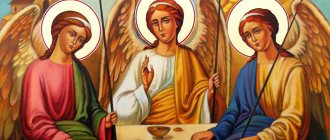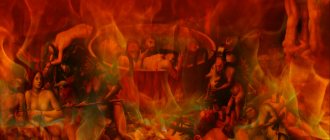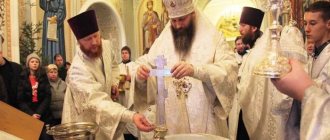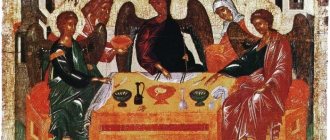The dogma of the Holy Trinity is the main dogma of Christianity and a stumbling block for the human mind, which is in the darkness of unbelief. This dogma is often reproached by Christians to point out the vagueness and contradictory nature of their concepts about God. Even among those for whom the authority of Holy Scripture is immutable, there are those who criticize or doubt the teaching of the ancient Church of Christ about one God in the Trinity.
What is confusing is clear: one is not equal to three, three cannot be one. Where to start trying to understand the dogma of the Holy Trinity? Let's figure it out.
How not to think about the trinity of God?
Anyone who wants to talk about the nature of the Divine must understand that he is stepping on ground on which to walk without reverence means endangering his soul. One should not think that the dogma of the Holy Trinity is so simple to explain.
Trinity theology underlies the Church's teaching about God and has been developed over several centuries.
Theologians and learned men of many generations have racked their brains to express in words the Revelation of the Unity of the Divine in Trinity and His Trinity in Unity. This was not easy, gave rise to several heretical teachings and was settled by Ecumenical Councils .
We must choose our words carefully and reverently when attempting to explain the doctrine of the Holy Trinity to others.
A little about the Creation of the world
Photo: Pravoslavie.ru
In the beginning, God created Heaven and Earth. And the Spirit of God hovered over the water. Before the appearance of Christ, the Spirit of God existed as a continuation of the Creator. Christ turned out to be the son of God, the third incarnation of the Lord who appeared on Earth. The Holy Trinity is one God in three incarnations. He has one nature and 3 self-consciousnesses. It is impossible to understand His essence, but it can be compared with the Sun, which shines brightly and at the same time warms.
What should you know about the Holy Trinity?
We believe that our Lord is a Trinity, consubstantial and indivisible. By nature, He is One God in three Persons: Father, Son and Holy Spirit. Each hypostasis is God, but They are not three gods, but one Deity . Each of the Persons of the Holy Trinity has special, hypostatic properties. The Father is not born from anyone and does not come from anyone. The Son is eternally born from the Father. The Holy Spirit proceeds eternally from the Father.
Modern theological science simultaneously adheres to two approaches to the knowledge of God, cataphatic and apophatic.
The cataphatic , affirming approach based on the example of Holy Scripture, the teachings of the Holy Fathers and Teachers of the Church speaks of the One Divinity of the Father, the One Divinity of the Son, eternally born from the Father, and the One Divinity of the Holy Spirit proceeding from the Father. Quotations from the Holy Scriptures tell us about the Divinity of the Son and the Holy Spirit. The teachings of the Holy Fathers of the Church and the decrees of the Ecumenical Councils explain the Orthodox teaching about the Holy Trinity.
The apophatic approach suggests that the doctrine of the Trinity of the Divine cannot be fully comprehended by the human mind. The knowledge of the Trinity is revealed to the pure heart of a Christian ascetic after many years of prayer and spiritual deeds.
A Christian must simultaneously take into account both approaches, balancing in his understanding of the trinity of the Godhead.
Iconography
The iconographic tradition of depicting the Trinity, first of all, reflects several biblical episodes, of which the Eternal Council and Hospitality of Abraham are widespread, the appearance of the Trinity to Alexander of Svirsky and the Holy Life-Giving Trinity with Acts are less commonly mentioned [3]
Great Moscow Cathedral 1666-1667 forbade depicting God the Father (Chapter 43). This concerned the iconographic subjects common at that time:
- Shestoday - “an image of the six-day universal creation of God, in which God the Father is written on pillows lying down”;
- Fatherland or New Testament Trinity - “the image of Hosts in the person of an aged man and the only begotten Son of God in His womb and between them the Holy Spirit in the form of a dove”;
- "The Annunciation with God the Father breathing from the mouth."
Simple analogies
Christian missionaries have always found some analogies that help them get closer to the great revealed mystery of the Trinity.
Sun
Speaking about unity in trinity, they point to the sun, which has the shape of a ball, gives birth to light, and exudes heat. Indeed, the sun is perceived by man in three ways: as a ball, as a source of light, as a source of heat, and one - as a star.
Human
The second analogy is the tripartite nature of man. In the trichotomy of man, some theologians see the image and likeness of God. Man, united by nature, has a bodily component, a sensory component and a spiritual component.
Clay brick
Saint Spyridon of Trimifunt testified before the participants of the First Ecumenical Council of the Trinity of the Divinity, clutching a clay brick in his hand. When fire broke out from the brick, water flowed out and sand poured out, the Saint pointed out the three-component nature of the brick and its unity at the same time.
clover shamrock
Saint Patrick, speaking of the Holy Trinity, showed a clover shamrock. The three-component structure of a leaf on one stem helped to understand the principle of the unity of the three.
The most difficult thing about the Christian concept of the Trinity is that there is simply no way to properly explain it. The very essence of the Trinity is inaccessible to human understanding, much less explanation. God towers above us in His immensity, so we should not expect that we can fully understand Him. The Bible teaches that the Father is God, the Son is God, and the Holy Spirit is God. The Bible also says that there is only one God. And although we can to some extent understand what the relationships between the persons of the Trinity are, yet the fullness of these relationships is inaccessible to the human mind. However, this does not mean that the doctrine of the Trinity is incorrect or unbiblical.
In examining this question, it must be borne in mind that the word “Trinity” is not used in Holy Scripture. This term is used to describe the triune God - the three co-existing, eternal Persons who are God. This in no way means that there are three Gods; The Trinity is one God in three persons. Even if the word “Trinity” does not appear in the Bible, there is no reason to avoid using it, since it makes more sense to use this word than the long phrase: “three co-existing, eternal Persons who are one God.” If you're confused by this fact, consider this: The word "grandfather" also never appears in the Bible, although we do know that the Bible mentions grandfathers such as Abraham, who was Jacob's grandfather. Therefore, do not focus too much on the word “Trinity” itself. What really matters is the biblical idea REPRESENTED by this word. Now let us pay attention to the texts from the Bible related to the Trinity:
1) There is one God.
Deuteronomy 6:4
Hear, O Israel: The Lord our God is one Lord;
1 Corinthians 8:4
So, about eating food sacrificed to idols, we know that an idol is nothing in the world and that there is no other God but the One.
Galatians 3:20
But there is no mediator with one, but there is only one God.
1 Timothy 2:5
For there is one God, and one mediator between God and men, the man Christ Jesus,
2) The Trinity consists of three persons
Genesis 1:1
In the beginning God created the heaven and the earth.
Genesis 1:26
And God said: Let us make man in Our image and after Our likeness, and let them have dominion over the fish of the sea, and over the birds of the air, and over the cattle, and over all the earth, and over every creeping thing that moves on the earth.
Genesis 3:22
And the Lord God said: Behold, Adam has become like one of Us, knowing good and evil; and now, lest he stretch out his hand, and also take from the tree of life, and eat, and live forever.
Genesis 11:7
Let us go down and confuse their language there, so that one does not understand the speech of the other.
Isaiah 6:8
And I heard the voice of the Lord saying: Whom shall I send? and who will go for Us?
And I said: here I am, send me.
Isaiah 48:16
Come to Me, listen to this: I did not speak in secret at first; from the time this happens, I have been there; and now the Lord God and His Spirit have sent me.
Isaiah 61:1
The Spirit of the Lord God is upon Me, for the Lord has anointed Me to preach good news to the poor, sent Me to heal the brokenhearted, to preach liberation to the captives and the opening of prison to the prisoners,
Matthew 3:16, 17
And having been baptized, Jesus immediately came out of the water, and behold, the heavens were opened to Him, and John saw the Spirit of God descending like a dove and descending on Him. And behold, a voice from heaven said: This is My beloved Son, in whom I am well pleased.
Matthew 28:19
Go therefore and teach all nations, baptizing them in the name of the Father and the Son and the Holy Spirit,
2 Corinthians 13:13
The grace of our Lord Jesus Christ, and the love of God the Father, and the fellowship of the Holy Spirit be with you all. Amen.
When familiarizing yourself with Old Testament texts, knowledge of the Hebrew language helps. Genesis 1:1 uses the plural noun Elohim, and Genesis 1:26; 3:22; 11:7 and Isaiah 6:8 use the pronoun “we.” That these words refer to more than two persons is certain. The fact is that if in the Russian language there are only singular and plural numbers, then in Hebrew there are singular, paired and plural. The paired number only refers to paired objects such as eyes, ears and hands. The words “Elohim” and “we” are used in the plural, that is, they refer to three or more persons (Father, Son and Holy Spirit).
In Isaiah 48:16 and 61:1, the Son speaks by reference to the Father and the Holy Spirit. Compare the texts below to see if it was the Son speaking.
Isaiah 61:1
The Spirit of the Lord God is upon Me, for the Lord has anointed Me to preach good news to the poor, sent Me to heal the brokenhearted, to preach liberation to the captives and the opening of prison to the prisoners,
Luke 4:14–19
And Jesus returned in strength of spirit to Galilee; and fame about Him spread throughout the surrounding country. He taught in their synagogues and was glorified by everyone.
And he came to Nazareth, where he had been brought up, and, as was his custom, he entered the synagogue on the Sabbath day and stood up to read. He was given the book of the prophet Isaiah; and He opened the book and found the place where it was written: “The Spirit of the Lord is upon Me; For He has anointed Me to preach good news to the poor, and He has sent Me to heal the brokenhearted, to preach release to the captives, recovery of sight to the blind, to set at liberty those who are oppressed, to preach the acceptable year of the Lord.”
Matthew 3:16-17, which records the baptism of Jesus, depicts God the Holy Spirit descending on God the Son while God the Father declares his favor to the Son. Matthew 28:19 and 2 Corinthians 13:13 also mention three distinct persons of the Trinity.
Matthew 28:19
Go therefore and teach all nations, baptizing them in the name of the Father and the Son and the Holy Spirit,
2 Corinthians 13:13
The grace of our Lord Jesus Christ, and the love of God the Father, and the fellowship of the Holy Spirit be with you all. Amen.
3) Many biblical texts distinguish between the members of the Trinity: in the Old Testament, “LORD” is distinguished from “Lord” (Genesis 19:24). “The LORD” has a “Son” (Psalm 2:7; Proverbs 30:2-4). “Spirit” is distinguished from “the LORD” (Numbers 27:18) and from “God” (Psalm 50:10-12). God the Son is different from God the Father.
Psalm 44:6, 7
Your arrows are sharp, the nations will fall before You, they are in the heart of the enemies of the King. Thy throne, O God, endures forever; the scepter of righteousness is the scepter of your kingdom.
Hebrews 1:8, 9
And about the Son: “Thy throne, O God, is for ever and ever; The scepter of Your kingdom is the scepter of righteousness. You loved righteousness and hated iniquity, therefore, O God, Your God has anointed You with the oil of joy more than Your fellows.”
In the New Testament, Jesus asks the Father to send a Helper - the Holy Spirit.
John 14:16, 17
And I will pray the Father, and he will give you another Comforter, that he may abide with you forever, the Spirit of truth, whom the world cannot receive, because it neither sees Him nor knows Him; and you know Him, for He abides with you and will be in you.
This indicates that Jesus does not consider himself the Father or the Holy Spirit. This also applies to all other places in the Gospels in which Jesus addresses the Father. Was He talking to Himself? Of course not. He spoke with another Person of the Trinity - the Father.
4) Each member of the Trinity is God:
Father is God
John 6:27
Do not strive for the food that perishes, but for the food that endures to eternal life, which the Son of Man will give you, for the Father, God, has set His seal on Him.
Romans 1:7
To all the beloved of God who are in Rome, the called saints: grace to you and peace from God our Father and the Lord Jesus Christ.
1 Peter 1:2
according to the foreknowledge of God the Father, with sanctification of the Spirit, to obedience and sprinkling of the blood of Jesus Christ: grace and peace be multiplied to you.
The Son is God
John 1:1
In the beginning was the Word, and the Word was with God, and the Word was God.
John 1:14
And the Word became flesh and dwelt among us, full of grace and truth; and we saw His glory, glory as of the only begotten of the Father.
Romans 9:5
theirs are the fathers, and from them is Christ according to the flesh, who is over all God, blessed forever, amen.
Colossians 2:9
for in Him dwells all the fullness of the Godhead bodily,
Hebrews 1:8
And about the Son: “Thy throne, O God, is for ever and ever; The scepter of Your kingdom is the scepter of righteousness.
1 John 5:20
We also know that the Son of God came and gave us light and understanding, so that we may know the true God and may we be in His true Son Jesus Christ. This is the true God and eternal life.
Holy Spirit - God
John 14:16, 17
And I will pray the Father, and he will give you another Comforter, that he may abide with you forever, the Spirit of truth, whom the world cannot receive, because it neither sees Him nor knows Him; and you know Him, for He abides with you and will be in you.
Acts 2:1–4
When the day of Pentecost arrived they were all with one accord together. And suddenly there came a sound from heaven, as from a rushing strong wind, and it filled the whole house where they were sitting. And cloven tongues as of fire appeared to them, and one rested on each of them. And they were all filled with the Holy Spirit, and began to speak in other tongues, as the Spirit gave them utterance.
Acts 5:3, 4
But Peter said: Ananias! Why did you allow Satan to put into your heart the idea of lying to the Holy Spirit and hiding from the price of the land? What you owned was not yours, and what was acquired by sale was not in your power? Why have you put this in your heart? You lied not to men, but to God.
Romans 8:9
But you do not live according to the flesh, but according to the Spirit, if only the Spirit of God dwells in you. If anyone does not have the Spirit of Christ, he is not His.
1 Corinthians 3:16
Do you not know that you are the temple of God, and the Spirit of God lives in you?
5) “Subordination” in the Trinity: The Bible testifies that the Holy Spirit is subject to the Father and the Son, and the Son is subject to the Father. This is an internal connection that does not deny the divinity of each Person of the Trinity. This is simply an area that our limited minds cannot understand.
Read more about the relationship between the Son and the Father: Luke 22:42; John 5:36; 20:21; 1 John 4:14.
About the Holy Spirit: John 14:16; 14:26; 15:26; 16:7 and especially John 16:13-14.
6) Each member of the Trinity performs different functions.
The father is the main source and reason for:
- universe (1 Corinthians 8:6; Revelation 4:11);
- divine revelation (Revelation 1:1);
- salvation (John 3:16-17)
- Jesus' ministry on earth (John 5:17; 14:10).
All this happens thanks to the Father.
The Son is the mediator through whom the Father does the following work:
- creation and maintenance of the universe (1 Corinthians 8:6; John 1:3; Colossians 1:16-17);
- divine revelation (John 1:1; Matthew 11:27; John 16:12-15; Revelation 1:1)
- salvation (2 Corinthians 5:19; Matthew 1:21; John 4:42).
The Father does all this through the Son, who acts as His representative.
With the help of the Holy Spirit, the Father does the following work:
- creation and maintenance of the universe (Genesis 1:2; Job 26:13; Psalm 103:30);
- divine revelation (John 16:12-15; Ephesians 3:5; 2 Peter 1:21);
- salvation (John 3:6; Titus 3:5; 1 Peter 1:2)
- ministry of Jesus (Isaiah 61:1; Acts 10:38).
So the Father does all this through the power of the Holy Spirit.
All sorts of modern illustrations of the Trinity do not convey its meaning accurately enough. Comparison with an egg (or apple) does not convey the essence of this concept, since the shell, white and yolk are components of the egg, and not the egg itself. The Father, Son and Holy Spirit are not parts of God, but each of Them is God. The example with water illustrates this concept a little better, but still does not fully reflect the Trinity. Liquid, steam and ice are forms of water. The Father, Son and Holy Spirit are not forms of God, but each of Them is God. So while these visual examples may give us a picture of the Trinity, the picture will not be completely accurate. The infinite God cannot be fully described by limited examples and illustrations. Instead of focusing on deciphering the concept of the Trinity, it is better to pay attention to how great and limitless God is compared to us!
Romans 11:33, 34
Oh, the depth of wealth and wisdom and knowledge of God! How incomprehensible are His destinies and His ways unsearchable, for who has known the mind of the Lord? Or who was His adviser?
How do Evangelical Christians differ from Catholics and Orthodox Christians?
AutoR: admin
| 14 Oct 2017
How do Evangelical Christians differ from Catholics and Orthodox Christians?
Evangelical Christians are Christians who belong to one of several independent Christian churches. Evangelical Christians, Catholics and Orthodox Christians, adhere to the fundamental principles of Christianity. For example, they all accept the Nicene-Constantinopolitan Creed, adopted by the first Council of the Church in 325. They all believe in the death, burial and resurrection of Jesus Christ, in His divine essence and future coming. All three schools accept the Bible as the Word of God and agree that repentance and faith are necessary to have eternal life and escape hell. According to Operation Peace, there are about a billion evangelical Christians, more than a billion Catholics and 250 million Orthodox Christians worldwide. However, the views of Catholics, Orthodox and Evangelical Christians on some issues differ. Evangelical Christians value above all else the authority of the Bible and the right of every person to understand it without the mediation of a special caste of priests. Orthodox and Catholics value their traditions above the authority of the Bible, and also claim that only the leaders of these Churches can interpret the Bible correctly. The main differences between these three faiths are rooted in this fundamental fact. Below are answers to some questions you may have about the differences between the Orthodox, Catholic and Protestant Churches, but first a brief history of evangelical Christians.
Read completely "
Topics:
History of the Church of God | Your feedback "
God the Son
The earthly incarnation of God, that is, Christ. Unlike the Father, Christ is born. He was ordered to appear on earth to save humanity from many sins. This is the embodiment, on the one hand, of the Divine essence of man, on the other, of God, who appeared to take upon himself the sins of all mankind and give hope for the salvation of generations, both of that time and of those who will then be born until the end of time.
God the Son, unlike the Father, was born of the Virgin Mary. This is the earthly incarnation of God. However, even He obeys the Father. In the prayer “Let this cup pass from me,” Christ knew perfectly well about his death on the cross and about all the suffering that He would have to endure. But, nevertheless, he could not disobey the Father. However, in all the torment there was a certain meaning - Christ lifted the curtain to eternal life, giving the commandments of love in order to be saved and find ourselves in the Kingdom of God for each of us.
Christmas 2021-2022 (2021.12.26 and 2022.01.09)
AutoR: admin
| 29 Dec 2021
Christmas service 12/26/2021 and 01/09/2022
“Glory to God in the highest, and on earth peace, good will toward men!”
Luke 2:14
Read completely "
Topics:
Our holidays | Your feedback "
Interesting Facts
- The word "Trinity" is not a name for God, but a theological term indicating the essence of the Godhead.
- The idea of trinity can be traced in many pagan religions, which can serve as proof of the truth of the Christian doctrine of the Trinity: all nations descend from Noah, who knew the True God (Gen. 6:9). His descendants could preserve the memory of the True God, although in a greatly distorted form.
- When describing the unity of God in the Bible, for example in the verse “The Lord our God, the Lord is one”
(Deut. 6:4), the Hebrew word echod (one) is used, which does not mean an absolute homogeneous unity, but often a complex unity. For example: a husband will cleave to his wife and they will become one (echod) flesh (Gen. 2:24). - The founder of Islam, Muhammad, did not know the Christian doctrine of the Trinity, but he heard about it, which was reflected in the Koran. The Quranic Trinity consists of Allah, Jesus and the Virgin Mary (instead of the Holy Spirit) (Sura 5:116).
Who are Protestants?
AutoR: admin
| 22 Sep 2016
Who are Protestants?
Let's start with the fact that the word PROTESTANTISM comes from the Latin word protestatio - a solemn statement, proclamation, assurance; protest, objection, disagreement.
Among world religions, Protestantism can be briefly described as one of the three, along with Catholicism and Orthodoxy, main directions of Christianity, which is a collection of numerous and independent Churches and denominations. We need to dwell in more detail on the question: who are Protestants from a theological point of view?
Read completely "
Topics:
History of the Church of God | Your feedback "
Reading the Bible in different languages
AutoR: admin
| 30 Jan 2013
Reading the Bible in different languages
| In Belarusian: | In English: |
For in-depth Bible study, the BibleQuote program is recommended. It is, in our opinion, one of the best Bible programs and is also completely free. We bring to your attention several training videos on how to use this program, as well as links to download the program itself and its modules. Read completely "
Topics:
Studying the Bible | 1 review »
Water baptism 2021.12.19
AutoR: admin
| 30 Dec 2021
Water baptism 2022.12.19
“Whoever believes and is baptized will be saved”
Mark 16:16
Read completely "
Topics:
Convert Baptisms | Your feedback "










